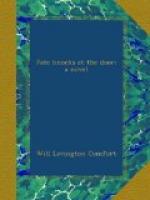That was a frequent saying of the Captain’s about the States. Twice a year at least, he was accustomed to make the voyage to New York.... The truth was, the old man felt a yearning for something the years and India had given Bedient. He felt much more than he said, and often regarded the young man, as one rapt in meditation.... His interest in Gobind and the Himalayas was insatiable; much more eagerly did he listen regarding the Punjab than about the ports he had known so well—and the changes that had passed under the eyes of the young man in Manila and Japan.... When Bedient was relating certain events of days and nights, that had become happy memories through the little things of the soul, Captain Carreras would start to convey the indefinite desires he felt; then suddenly, the deep intimacy of his revelations would appear to his timid nature, and even in the mothering dark, the panic would strike home—and he would swing off with pitiful humor about goats or some other Island affair....
Bedient had an odd way of associating men whom he liked with mothers of his own imagining. Happily discovering fine qualities in a man, he would conjure up a mother to fit them.... Often, he saw the little Englishwoman whose boy had taken early to the seas.... She was plump and placid in her cap; inclined to think a great deal for herself, but still she allowed herself to be kept in order mentally and spiritually by her husband, whose orthodoxy was a whip. Perhaps she died thinking her tremulous little departures were sure attractions of hell and heresy. Bedient liked to think of her as vastly bigger than her mate, bigger than she dreamed—but alone and afraid.
SEVENTH CHAPTER
ANDANTE CON MOTO—FIFTH
For the first time in his life, Bedient learned what America liked to read.... All the finer expressions of the human mind and hand gave him deep joy. His love and divination for the good and the true were the same that characterized the rarest minds of our ancestors, who had access only to a few noble books in their formative years. And Bedient’s was the expanded and fortified intelligence of one who has grown up with the Bible.
Each ship brought the latest papers, periodicals and certain pickings from the publishers’ lists. India had not prepared Bedient for this. With glad welcome he discovered David Cairns here and there among short-story contributors, but the love of man and woman which the stories in general exploited, struck him of Indian ideals as shifty and pestilential. The woman of fiction was equipped with everything to make her as common as man. She was glib, pert, mundane, her mind a chatter-mill; a creature of fur, paint, hair, and absurdly young. The clink of coins was her most favorable accompaniment; and her giving of self was a sort of disrobing formality. The men who pursued her were forward and solicitous. There was something of sacrilege about it all. The minds and souls of real women—such were not matters for American story; and yet the Americans wrote with dangerous facility. Bedient, who worshipped the abstraction, Womanhood, felt his intelligence seared, calcined.... Only here and there was a bit of real literature—usually by a woman. The men seemed hung up to dry at twenty-five. There was no manhood of mind.




